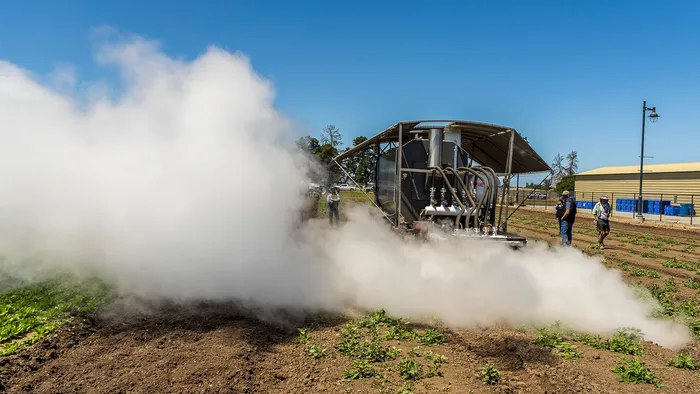Organic Grower Summit: Get rid of pests, weeds the natural wayOrganic Grower Summit: Get rid of pests, weeds the natural way
Weed and pest management practices will be examined in a panel discussion during the Organic Grower Summit in Monterey, California on Dec. 4. Learn more.
October 14, 2024

At a Glance
- Organic farmers can’t use the same tools as conventional growers to battle insects and weeds.
- Vonnie Estes, a VP at the International Fresh Produce Association, will moderate a discussion of holistic approaches.
California Organic Ag Institute Director Houston Wilson likens pest control in organic crops to the use of “many little hammers.”
The broad spectrum tools common to conventional growers don’t exist. Organic farmers must use a more targeted, holistic approach to insect control.
Similarly, weed control in organic systems is a tough one as effective organic herbicides simply do not exist, according to Brad Hanson, extension weed specialist with the University of California, Davis.
Weed and pest management practices will be examined in a panel discussion during the Organic Grower Summit in Monterey, California, on Dec. 4. The annual Organic Grower Summit runs Dec. 4-5 at the Hyatt Regency Monterey Hotel & Spa. Information on the event and online registration is available.
The panel is moderated by Vonnie Estes, VP of innovation, International Fresh Produce Association. Panelists include Eric Morgan, VP, environmental science & resources, Braga Fresh; Doug Currier, technical director, Organic Materials Review Institute; Kim Horton, agronomy manager, Taylor Farms; and Gina Colfer, sustainable solutions manager, Wilbur Ellis Ag.

Extension specialists with the universities of Arizona and California are collaborating on steam technology that shows promise in controlling weed seeds and soil pathogens in organic systems. The technology is in prototype development and is being studied in cropping systems in Yuma, Arizona, and Salinas, California. Credit: Todd Fitchette
Organic challenges to pest, weed control
Wilson and Hanson are colleagues with the University of California. Both serve as extension advisers to farmers, connecting them with technology and research on insect and weed control issues.
Both agreed that within organic systems, a holistic approach is the most effective means to address troublesome insects and weeds.
As an entomologist who spends much of his time studying insects in almonds and pistachios, Wilson says the large broad spectrum insecticide “hammers” available to farmers of conventional crops are simply not available in certified organic formulations.
While there are registered products available to organic farmers in a host of crops, they tend to be less effective per unit of product. In some cases, integrated pest management (IPM) practices can help. In others, as is the case with the Carpophilus truncatus beetle in almonds, chemical control is the only known tool available.
Hanson is a weed scientist who works primarily in conventional systems. Nevertheless, he knows that regardless of the system, controlling weed seeds is critical in managing the invasive plants.
“I would say that’s got to be one of their biggest challenges,” he said of weed control in organic systems. “Especially in California, you’ve got fewer tools at your disposal to manage those weeds. Any good organic weed manager must be diligent and focused on eliminating seed production.”
More information about the Organic Grower Summit or the 2024 admissions policy is available on the website, or via email at [email protected].
Correction: The correct website and content information were added to this story on Oct. 16, 2024.
Read more about:
OrganicAbout the Author
You May Also Like





